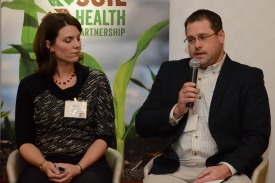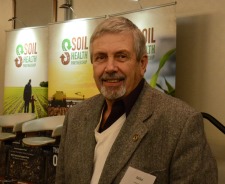“There are a couple of goals being a part of this. Some include sharing the information with local farmers about the Soil Health Partnership and using cover crops; having them touch, feel, and see what they can do for the soil and what they can do for farms.” The Sanders’ family farm was one of the first involved and got started with SHP in 2014. A sentiment echoed between many of the demo farmers is the excitement for what they’re going to see take place in their fields over the next few years and how they can share that insight with other growers.
“We can share the data with other farmers about look, this is what it’s done for the microbes, this is what it’s done for the yields, it’s done this for our investment.” The Sanders’ farm has shared yield data the last few years to help show the potential of implementing cover crops. Carrie is excited about working with AgSolver to aggregate the data collected through the project to really understand it and to be able to share that information with interested growers.
Listen to the rest of Carrie’s interview: [wpaudio url=”http://traffic.libsyn.com/zimmcomm/shs-16-sanders.mp3″ text=”Interview with Carrie Sanders, The Nature Conservancy”]
Mike Buis is looking forward to what the next few years will bring as he learns from the members of the Soil Health Partnership and fellow demo farmers. “Listening to a lot of the speakers today, we’re looking at the economic value, we’re looking at saving the soil, and we’re looking at different cover crop variations.”Buis hasn’t had a lot of experience with cover crops as of yet, but has been researching and reading about the possibilities with implementing cover crops. “I’ve been reading about it and have other friends who have tried it, liked it, and have improved their yields on a lot of their marginal ground. We have real good ground, we have some marginal ground, and we have overflow ground. We’re trying to improve our soil.”
Buis’ farm in Central Indiana had 8 inches of rain in June and 8 inches of rain in July so they experienced a loss of nitrogen and soil. Buis elaborated, “If we want to hand this ground to our younger generations, then we need to protect it.”
Mike signed up in 2015 and is excited to hit the ground running in 2016 as they start planning.
Listen to the rest of Mike’s interview: [wpaudio url=”http://traffic.libsyn.com/zimmcomm/shs-16-buis.mp3″ text=”Interview with Mike Buis, Indiana Farmer”]


